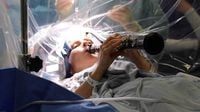In a remarkable convergence of medical science and personal passion, a 65-year-old woman named Denise Bacon played her clarinet during an intricate brain surgery at King’s College Hospital in London—an event that not only marked a milestone in her own battle with Parkinson’s disease but also highlighted the extraordinary possibilities of modern neurosurgery.
On October 24, 2025, Bacon, a retired speech and language therapist from Crowborough, East Sussex, underwent a four-hour procedure known as Deep Brain Stimulation (DBS). The operation, led by Professor Keyoumars Ashkan, involved implanting electrodes into the brain regions responsible for movement and connecting them to a pulse generator in her chest. Unlike most surgeries, Bacon remained awake throughout, her clarinet at the ready. The reason? Her ability to play music served as a real-time barometer for the surgical team, allowing them to fine-tune the placement of the electrodes and immediately assess improvements in her motor skills.
Parkinson’s disease, a progressive neurological disorder, had gradually stolen much of Bacon’s mobility and joy. She had lost the ability to walk, swim, dance, and, most heartbreakingly, to play her beloved clarinet in the East Grinstead Concert Band. “I used to play in the East Grinstead Concert Band,” she recalled. “And I had to stop around about lockdown, I remember I just couldn’t keep going and it was mainly because the fingers weren’t pressing.” Diagnosed in 2014, Bacon had watched her world shrink as tremors, stiffness, and slowed movement made everyday activities ever more difficult.
The innovative approach at King’s College Hospital was tailored specifically to her most cherished goal: reclaiming her music. Professor Ashkan explained, “As a keen clarinettist, it was suggested Denise bring her clarinet into the operating theatre to see whether the procedure would improve her ability to play, which was one of Denise’s main goals for the surgery.” According to BBC, the surgical team created small holes in Bacon’s skull to access the brain’s movement centers. Once the electrodes were in place, they delivered carefully calibrated electrical impulses—essentially sending new instructions directly to her nervous system.
What happened next was nothing short of miraculous. As the team switched on the stimulation, Bacon’s left-hand fingers, which had been stiff and slow, suddenly moved fluidly. She began to play her clarinet again, right there in the operating room. “I remember my right hand being able to move with much more ease once the stimulation was applied, and this in turn improved my ability to play the clarinet, which I was delighted with,” Bacon shared, her words echoing both relief and joy.
Playing an instrument mid-surgery might sound like something from a medical drama, but in this case, it served a crucial purpose. The live feedback allowed Ashkan and his team to optimize the electrode placement, maximizing the benefit and minimizing side effects. “We tend to do these operations awake, so that we can assess the patient on the table,” Ashkan told reporters. The goal was not just to alleviate symptoms, but to restore a piece of Bacon’s identity—her music.
Deep Brain Stimulation is not a cure for Parkinson’s disease, Ashkan emphasized, but it can be a game-changer for patients whose symptoms no longer respond well to medication. “The first line of treatment for Parkinson’s disease is not surgery; it’s medical management drugs,” he explained, noting that over time, medications may lose their effectiveness or cause intolerable side effects. “At that stage surgery could potentially have a real role.”
The operation’s success was immediately apparent. “It was just amazing to see and feel my fingers moving better and faster during the operation than they had been able to in recent times,” Bacon said. Her experience is a testament to the resilience of the human brain—and spirit. For the next 20 years, the chest-implanted pulse generator will continue to deliver electrical impulses, offering her the chance to return to not just music, but also to walking, swimming, and dancing.
This was not the first time King’s College Hospital had witnessed music in the operating room. In 2020, a violinist played her instrument while surgeons removed a tumor from her brain, a case that also drew international attention. These extraordinary moments are more than medical feats; they are, in the words of Michael S Okun, co-author of The Parkinson’s Plan and medical adviser for the Parkinson’s Foundation, “windows into the resilience of the human brain and spirit.” Okun added, “It’s a myth that Parkinson’s lacks effective treatments. Deep Brain Stimulation, medications and rehabilitation can all dramatically restore function and quality of life.”
According to a spokesperson for King’s College Hospital, the personalized approach to Bacon’s surgery was designed not just to suppress symptoms but to help her reclaim the activities that gave her life meaning. The hospital’s team encouraged her to play throughout the operation, using her performance as a guide to adjust the stimulation for maximum benefit. The ability to immediately test the results—seeing her fingers move better and hearing the clarinet’s notes ring out—was a powerful indicator that the procedure was working.
Bacon’s story also shines a light on the broader advances in neurosurgery and neuroscience. The ability to perform such delicate operations with the patient awake, and to use real-time feedback from music or movement, represents a sea change in how surgeons approach complex brain disorders. It underscores the importance of personalized medicine—treating not just the disease, but the individual and their unique goals.
For Bacon, the operation has already brought meaningful change. She has noticed improvements in her walking and is looking forward to resuming other activities she once loved, like swimming and dancing. Her journey is a beacon of hope for others living with Parkinson’s, a reminder that even as the disease progresses, new treatments and technologies can offer a path back to the things that matter most.
Ultimately, Denise Bacon’s clarinet performance in the operating room was more than a medical milestone—it was a triumphant return to self-expression, orchestrated by a team determined to blend science, art, and compassion in the service of healing. Her experience stands as a testament to the power of innovation, the importance of personalized care, and the enduring strength of the human spirit.




